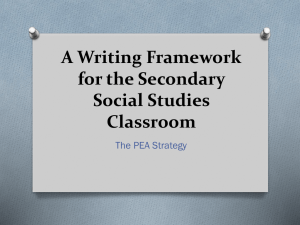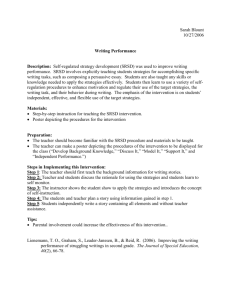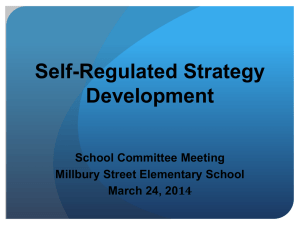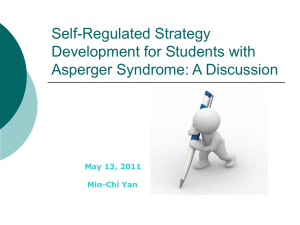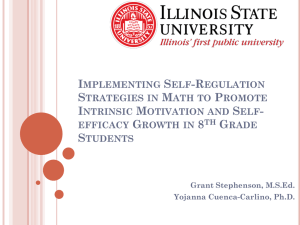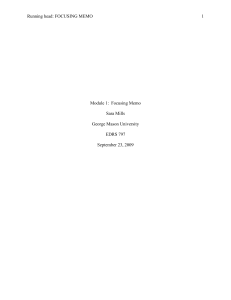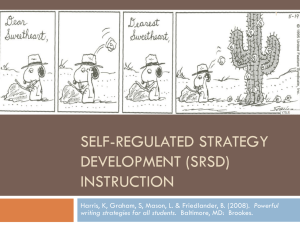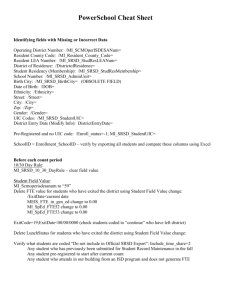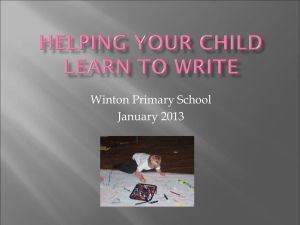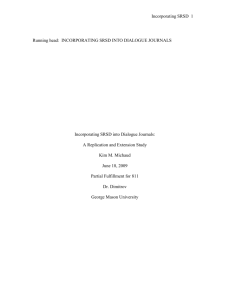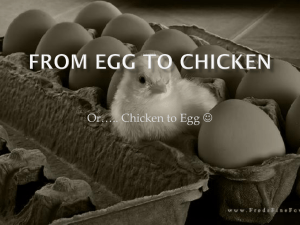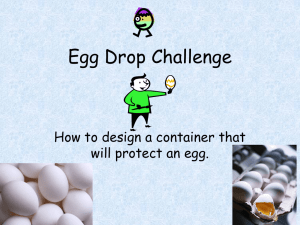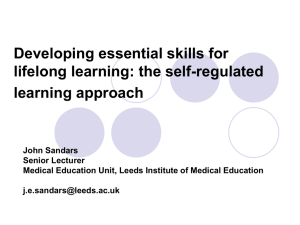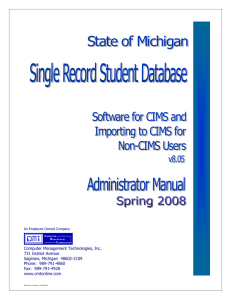SRSD - TN Core
advertisement
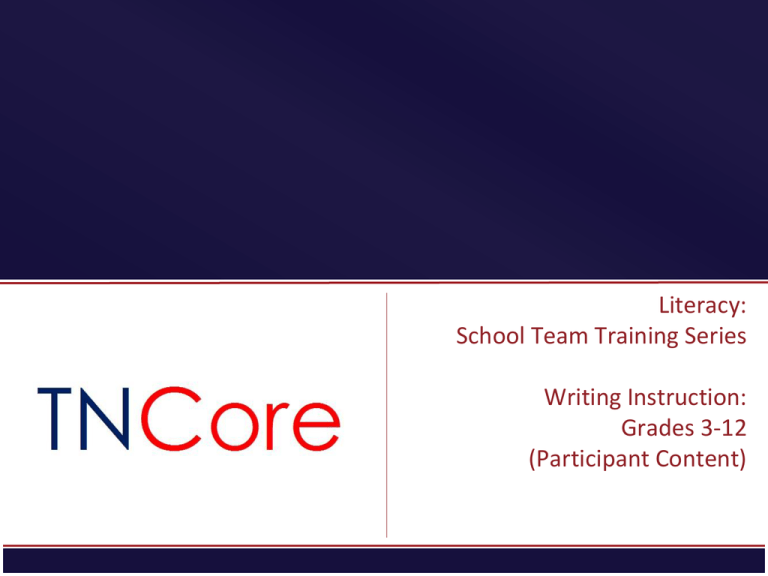
Literacy: School Team Training Series Writing Instruction: Grades 3-12 (Participant Content) Welcome When I am writing, I am trying to find out who I am, who we are, what we're capable of, how we feel…I love it for what it does for us, how it allows us to explain the pain and the glory, the nuances and delicacies of our existence. – Maya Angelou 1 Objectives for literacy training Through this training, literacy teachers will: • Understand the stages of Self-Regulated Strategy Development and be able to apply these stages to help students improve their writing • Understand the role of pre-assessment in writing instruction • Recognize the effectiveness of using mnemonics as a strategy to help students plan their writing • Investigate the use of exemplar essays, graphic organizers, collaborative writing, and peer feedback to help students improve their writing • Apply the use of self-talk and think alouds to engage students in self-regulation of thinking when planning and writing • Understand the scoring process and look at student growth in writing. 2 Agenda for the day 1. Introduction 2. Six Stages of Self-Regulated Strategy Development (SRSD) 3. Wrap Up •Questions? Write on note cards or ask during activities 3 Introductory video 4 INTRODUCTION TO SELFREGULATED STRATEGY DEVELOPMENT (SRSD) 5 Goals for Introductory section Participants will: •Identify Stages of Self-regulated Strategy Development (SRSD) •Outline the Bridge to Practice format •Reflect on your current writing practices using a self-assessment •Review the Common Core State Standards for Writing and Language; understand how SRSD can support students in achieving the Common Core State Standards 6 Quiz How many students scored proficient or above on the latest NAEP (National Association of Educational Progress) Writing Assessments? 67% 33% 51% 27% 7 Quiz Writing ties with what other academic skill as the greatest predictor of college and career opportunities? 8 Writing - Then and Now 9 What is SRSD? Self-Regulated Strategy Development Developed by Karen Harris, and colleagues How would you describe: •Strategies? •Self-regulation? 10 Remember… •SRSD Is Not a scripted program •SRSD is a pedagogical framework and a collection of best practices •SRSD offers resources “I absolutely love that SRSD is not a program. It is a set of procedures that I can internalize and integrate into my existing program.” (Quote from Karen Devereux, Literacy Specialist, Barton VT) 11 Why SRSD? Sample 1 (Myths about Insects): Spiders, ticks and bugs can creep in your house. Sample 2 (Surprising caterpillar birth facts): There are several facts about the birth of a caterpillar. the mother lays its egg at the end of summer, then dies. The egg is laid on a milkweed leaf. a newborn is up to 2-3 millimeters. when a baby caterpillar hatches it eats its own eggshell. Maybe the egg is laid on a milkweed plant to protect it from predators. 12 Why SRSD? A: Pre-test (Myths about insects) Spiders, ticks and bugs can creep in your house. B: Post-test (Surprising caterpillar birth facts) There are several facts about the birth of a caterpillar. 1) the mother lays its egg at the end of summer, then dies. 2) The egg is laid on a milkweed leaf. 3) a newborn is up to 2-3 millimeters. 4) when a baby caterpillar hatches it eats its own eggshell. Maybe the egg is laid on a milkweed plant to protect it from predators. 13 Still in Need of SRSD •Writing at the same time as Shakespeare was Miguel Cervantes. He wrote Donkey Hote. The next great author was John Milton. Milton wrote Paradise Lost. Then his wife died and he wrote Paradise Regained. •Socrates was a famous Greek teacher who went around giving people advice. They killed him. •Homer wrote The Oddity, in which Penelope was the last hardship that Ulysses endured on his journey. Actually, Homer was not written by Homer, but by another man of that name. 14 Self-Regulated Strategy Development -6-stage gradual release model -Integrates writing Process (stage 5): Plan, write, revise, publish -Explicit support and immersion in real writing 15 SRSD works 16 Bridge to Practice 17 Bridge to Practice 18 Self-Assessment 19 Common Core Alignment Reading Writing Speaking/ Listening Language Key Ideas and Details Text Types and Purposes Comprehension and Collaboration Conventions of Standard English Craft and Structure Production and Distribution of Writing Presentation of Knowledge and Ideas Knowledge of Language Integration of Knowledge and Ideas Research to Build and Present Knowledge Range of Reading and Level of Text Complexity Range of Writing Vocabulary Acquisition and Use 20 Definition of Text Types 21 Agenda for the day 1. Introduction 2. Six Stages of Self-Regulated Strategy Development (SRSD) 3. Wrap Up 22
